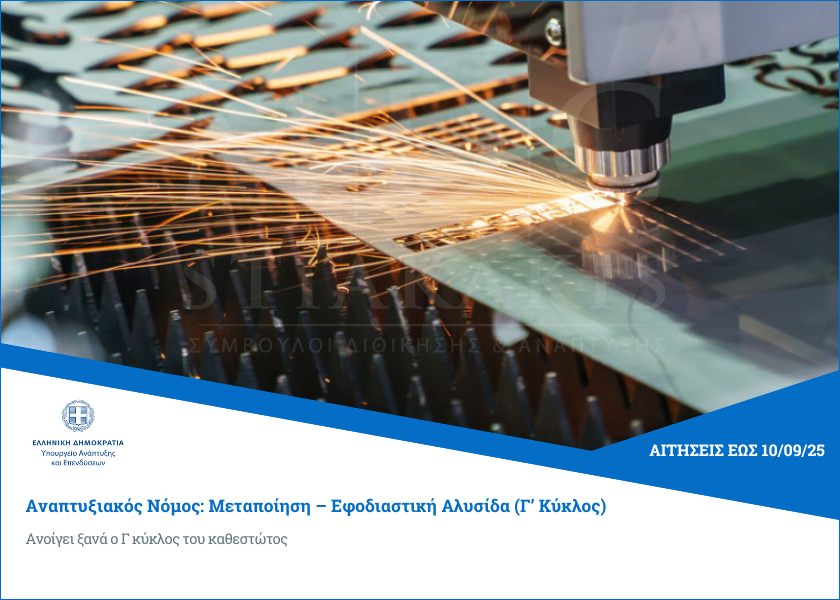The Development Law for Manufacturing – Supply Chain (3rd Cycle) reopens

Start Date: 01/07/2025
End Date: 31/10/2025
Purpose
The purpose of this scheme is to support investment projects in the manufacturing sector, excluding the processing of agricultural products for which a special scheme is established, as well as investment projects in the logistics sector. The aim is to promote technological, production, administrative, and organizational upgrades, as well as innovative and outward-looking development and growth, enhancing the competitive position of businesses in both the domestic and international markets.
Eligible Investment Projects
The scheme includes investment projects that fall within the manufacturing sector, excluding the processing of agricultural products.
The investment projects may constitute a complete initial investment as follows:
a. Establishment of a new facility.
b. Expansion of the capacity of an existing facility.
c. Diversification of a facility’s output into products or services that have never been produced or offered before, provided that the eligible expenses exceed at least two hundred percent (200%) of the net book value of the reused assets, as recorded in the fiscal year preceding the application for inclusion of the investment project.
d. Fundamental change in the entire production process of an existing facility. For large enterprises, the eligible investment costs must also exceed the depreciation of assets related to the activity to be modernized over the previous three (3) fiscal years.
Eligible and Excluded Beneficiaries
Eligible for aid under the schemes are investment entities established or having a branch in the Greek Territory at the time of starting the investment project and having one of the following legal forms:
- Commercial company,
- Cooperative,
- Social Cooperative Enterprises (Koin.S.Ep.), Agricultural Cooperatives (AS), Producer Groups (PG), Producer Organizations (PO), Civil Cooperatives, Agricultural Corporate Partnerships (A.E.S.),
- Companies under merger, provided they have completed publicity procedures before the start of the investment project,
- Joint ventures conducting commercial activity,
- Public and municipal enterprises and their subsidiaries,
The following are excluded from aid and scheme inclusion:
- Enterprises subject to ongoing recovery procedures of state aid (Deggendorf principle) at the time of application,
- Problematic enterprises,
- Enterprises that, within two (2) years prior to the application: a) have relocated the business unit for which the aid is requested, or b) refuse to commit not to relocate it for a two (2) year period after the completion of the investment,
- Enterprises implementing investment projects initiated and executed on behalf of the State based on a service or concession contract.
Types, Intensity and Amounts of Aid
The following types of aid are granted to investment projects included in the present aid schemes:
- Tax exemption
- Grant
- Leasing subsidy
- Subsidy for the cost of created employment
The maximum grant or subsidy amount is set at EUR 20 million.
Grants are provided to SMEs, while large enterprises are eligible for tax exemption.
Eligible Expenditures
Investment projects under this scheme are supported for all the following eligible regional aid expenses:
- Capital expenditures on tangible fixed assets, specifically for:
- Construction, expansion, and modernization of buildings and auxiliary installations, including accessibility infrastructure and surrounding area development.
- Purchase of all or part of existing tangible assets such as buildings, machinery, and other business facility equipment.
- Purchase and installation of new modern machinery and equipment, including technical installations and transport vehicles used within the facility.
- Leasing costs for new modern machinery and equipment under financial leasing contracts, with the condition that ownership is transferred to the lessee at the end of the lease term.
- Modernization of specialized installations not related to buildings, and mechanical installations.
- Capital expenditures on intangible assets, specifically for:
- Technology transfer through the purchase of intellectual property rights, licenses, patents, know-how, and non-patented technical knowledge.
- Quality assurance and control systems, certifications, procurement and installation of software, and enterprise management systems.
Additionally, and complementary to the regional aid under section 1, investment projects may be supported for the following categories of eligible non-regional aid expenses under Annex B:
- Consultancy services for SMEs
- Energy efficiency measures
- Installation of efficient district heating and/or cooling systems
- Remediation of environmental damage, restoration of natural habitats and ecosystems
- Efficient resource use and support for transition to a circular economy
- Vocational training expenses
- SME participation in trade fairs
- Hiring of disadvantaged workers and workers with disabilities
Non-eligible expenses:
The following costs are deemed ineligible and excluded from aid:
- Operating expenses of the investment
- Purchase of furniture and office equipment, unless essential to production
- Purchase of passenger cars with up to six (6) seats
- Purchase of land, plots, and agricultural parcels
- Contribution of real estate, machinery, and other fixed assets as equity capital
Financing Scheme of Investment Projects
Each entity must contribute to the project cost either with equity or with external financing.
At least twenty-five percent (25%) of the eligible cost must not contain any state aid, public support, or subsidy.
Minimum Investment Thresholds
To be eligible under the schemes of Part B, the minimum eligible investment cost must be based on the entity’s size, specifically:
a. EUR 1,000,000 for large enterprises,
b. EUR 500,000 for medium-sized enterprises,
c. EUR 250,000 for small enterprises,
d. EUR 100,000 for very small enterprises,
e. EUR 50,000 for Social Cooperative Enterprises (Koin.S.Ep.), Agricultural Cooperatives (AS), Civil Cooperatives, Producer Groups (PG), Producer Organizations (PO), and Agricultural Corporate Partnerships (A.E.S.).
Subscribe to our Newsletter to receive updates on every upcoming program.
We are at your disposal for any information or clarification you may need.


